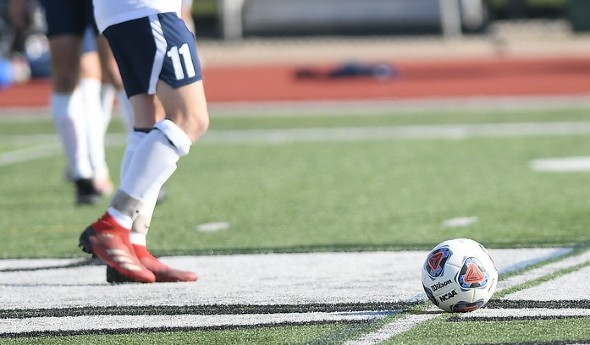
The Inherent Risk of Sport Specialization
April 30, 2018
 By Bob Gardner
By Bob Gardner
Executive Director of the National Federation of State High School Associations
One of the responsibilities that parents take most seriously is protecting their children from injury, whether it is buckling seat belts in a car or wearing a helmet while riding a bike. And when their kids become teenagers and want to participate in sports or other activities, parents do everything they can to keep their sons and daughters from getting hurt.
But not all injuries are caused by a twist, fall, collision or accident. Many are caused when young athletes repeat the same athletic activity so often that muscles, ligaments, tendons and bones don’t have time to recover—especially among middle school and high school students. These injuries can end promising careers, cost families tens of thousands of dollars, squash dreams and literally change lives.
Examples include elbow and arm injuries to teenagers who play baseball or softball all year long, shoulder injuries to year-round swimmers, wrist and elbow injuries to gymnasts, and stress fractures to soccer players.
The culprit, most often, is what’s commonly known as “sport specialization,” the process of playing the same sport all year long with the goal of either gaining a competitive edge or earning a college scholarship. It involves intense, year-round training in a single sport.
Research shows that sports specialization is putting teenage athletes at risk. According to a study commissioned by the National Federation of State High School Associations (NFHS) and conducted by researchers from the University of Wisconsin, high school athletes who specialize in a single sport are 70 percent more likely to suffer an injury during their playing season than those who play multiple sports.
The American Academy of Orthopedic Surgeons says much the same. It reports that “overuse injuries” (injuries caused when an athletic activity is repeated so often that parts of the body do not have enough time to heal) are responsible for nearly half of all sports injuries to middle school and high school students.
There is a solution. Young athletes should be encouraged to play multiple sports.
When student-athletes cross-train, they work different muscle groups and joints which, in fact, results in better overall conditioning. They also develop a new set of athletic skills like hand-eye coordination, balance, endurance, explosion and agility that are transferable to their primary sport. It’s no coincidence that 30 of the 32 first-round picks in the 2017 National Football League draft played multiple sports in high school.
Parents can play a key role in preventing these overuse injuries by encouraging their kids to play multiple sports rather than pushing them to specialize in one sport. They will have more fun, will be less likely to suffer burnout and will actually become better athletes.

Acupuncture Can Enhance Performance
January 5, 2021
Henry Ford Health System
In the ancient Chinese medicine of acupuncture, thin needles are gently inserted into specific areas of the body, stimulating blood flow to speed the recovery of certain ailments.
It can be used as a treatment for everything from headaches and unbalanced hormones to joint pain and weakened immune systems. Acupuncture is also popular among athletes, as many of them incorporate it into their wellness regimens to stay in peak physical condition.
“Back in the day, athletes ate steak, smoked cigars and drank whiskey during the week and then played football on Sunday,” says Thomas Betts, a sports medicine acupuncturist with Henry Ford Health System. “But today, to improve their performance, athletes are attacking the body from every angle possible with diet, lifestyle and exercise. NBA players, for example, have talked about how acupuncture keeps them feeling their best.”
But you don’t have to be an NBA star to reap the benefits of acupuncture. Whether you’re a professional or student athlete, or you exercise and play sports for fun or to challenge yourself, here are ways acupuncture can boost your game:
- Acupuncture can help you recover more quickly from an injury. “If a muscle is torn, acupuncture won’t put it back together, but for sprains and strains, muscle soreness and tendonitis, acupuncture can decrease inflammation and speed the healing process,” says Betts.
- Acupuncture can reduce the need for “rest days.” If you just had an intense workout and your muscles are sore, getting acupuncture afterward can loosen the muscles and decrease soreness so you don’t have to take a day off to recuperate before training again.
- Acupuncture can improve flexibility, decrease muscle tension and increase muscle activation. “This is done with motor point acupuncture,” says Betts. “The motor point is where the brain attaches to the muscle via the motor nerve. By using needles to stimulate a motor point, it is like rebooting a phone or computer that isn’t working well: Motor point acupuncture is autoregulating, in that it can deactivate a tight muscle or reactivate an inhibited or weak muscle.”
- Acupuncture can provide immediate pain relief. “Some studies show that acupuncture can provide as much as, if not more pain relief than medication,” Betts says. “It differs for everyone, and it depends on what is being treated, but some people say they feel a difference right after a session, and others say they feel better about 20 to 30 minutes later.” Pain relief can last from a few hours to a few days.
- Acupuncture can help prevent injury. Because acupuncture can reactivate weak muscles and decrease muscle tension, it can also be used as a preventative measure against injury, Betts says. But you should always still stretch before and after exercising!
Learn more about acupuncture and other integrative medicine services at Henry Ford. To make an appointment, you can request one online or by calling 1-833-246-4347.
Thomas Betts, DOAM, RAc, is a certified sports acupuncturist with Henry Ford Health System. He sees patients at the Henry Ford Center for Athletic Medicine in Detroit.


